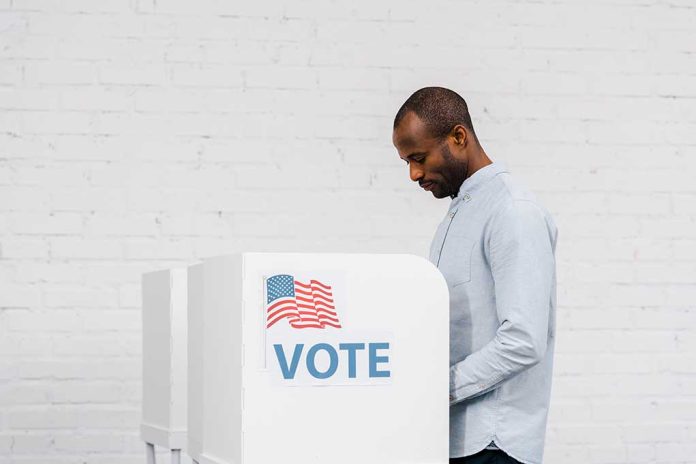
Black men are shifting their political allegiance, doubling support for Donald Trump in the latest presidential election and challenging long-held assumptions about minority voting patterns.
At a Glance
- Trump secured 21% of black male votes, compared to 7% of black female votes.
- Overall black voter support for Trump rose from 8% to 12% in eight years.
- Dissatisfaction with Democrats and appeal of GOP policies drive the shift.
- Trump’s personal experiences, like his mug shot, resonated with some black men.
- Criminal justice reform, including the First Step Act, attracted support.
A Surprising Shift in Political Allegiance
In a development that has caught many political analysts off guard, Donald Trump has made significant inroads with black male voters. This shift represents the highest level of nonwhite voter support for a Republican candidate since Nixon. The trend suggests a complex political realignment and a pursuit of community authenticity among black men.
The reasons behind this shift are multifaceted. Many black men express growing dissatisfaction with the Democratic Party’s policies and a newfound resonance with Trump’s vision for the GOP. This change in political loyalty challenges the conventional wisdom that has long assumed unwavering support for Democrats among minority voters.
Trump has doubled his support among Black voters from this point four years ago. If his support held, it'd be the best GOP performance since Richard Nixon in 1960 among Black voters….
Trump's doing it thanks to pulling in a quarter of Black voters under 50. pic.twitter.com/qDqBfRVLVA
— (((Harry Enten))) (@ForecasterEnten) May 17, 2024
Factors Driving the Change
Several factors contribute to this political realignment. Trump’s personal experiences, including his widely publicized mug shot, have unexpectedly resonated with some black men who see parallels with their own struggles within the justice system. This connection has led to a perception of Trump as more relatable than traditional politicians.
Criminal justice reform has played a significant role in attracting black male voters to Trump. The First Step Act, signed into law during Trump’s presidency, has been highlighted by supporters as evidence of his commitment to addressing issues important to the black community. Duke Tanner, a former boxer granted clemency by Trump, has been vocal about the impact of this legislation.
Democrats Face Challenges
The Democratic Party, long reliant on strong support from black voters, now faces the challenge of understanding and addressing this shift. Vice President Kamala Harris, despite her potential to become the first black female president, has struggled to retain black male support. Her efforts to implement policies like marijuana legalization, aimed at appealing to black men, have not been entirely successful in stemming the tide.
The perception that Democrats have taken black voters for granted has grown, with many feeling that the party has not adequately addressed their unique needs. This sentiment has opened the door for alternative political alignments, including support for Trump and the Republican Party.
A Broader Trend
The shift among black men is part of a larger trend of increasing support for Trump among minority voters. Latino and Asian American voters are also showing increased support for Trump, challenging traditional voting patterns. This diversification of political support poses significant challenges for Democrats in future elections.
“Black men, Hispanic men, minority men are independent voters,” says Lauren Harper Pope, a political and communications strategist.
As America becomes more diverse, political parties are adapting to new realities. The Republican Party’s efforts to appeal to minority voters, particularly men, through economic messaging and social conservatism, appear to be gaining traction. This evolving political landscape suggests that future elections may see continued shifts in traditional voting blocs, requiring both parties to reassess their strategies and policy positions to maintain or gain support among diverse voter groups.














